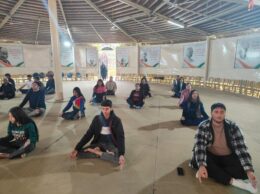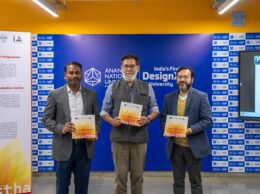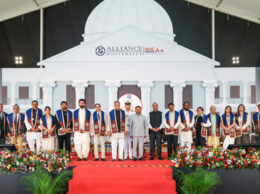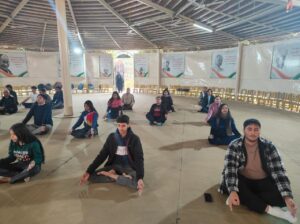Chennai, 11th July, 2019: Indian Institute of Technology Madras is organizing the First Abdul Kalam Conference on ‘Sustainable Development at Sustainable Cost’ from 11th to 14th July 2019 in collaboration with Taksha Institute (TI), Taksha Center for Smart Village Initiative (TCSVI), U.S. and Global Indian Business Council, U.S. IIT Madras is hosting this conference as first of a biennial series as India grows towards 2030.
This conference is intended to start a process towards Sustainable Growth. It will bring together the proponents of advanced technological concepts, with the social scientists and administrators who attend to public policy, and the NGO people who know the daily realities in rural India and have experience in making steady, determined progress.
The Conference is being held to works towards the late President Dr. A.P.J. Abdul Kalam’s project called ‘PURA’ (Providing Amenities in Rural Areas, as the first necessary step towards a Developed India).
Addressing the inauguration Session held today (11th July 2019), Dr. V. Ponraj, former Scientific Advisor to Dr. APJ Abdul Kalam, said, “Dr. Kalam had constituted 17 Task Teams with 500 members that worked for two years on his Vision 2020 for India and submitted a comprehensive set of recommendations to the Government of Shri Atal Bihari Vajpayee in 1998. It encompassed all domains from water, energy, environment, economy and employment, among others.”
Further, Dr. Ponraj added, “Integrated Actions for developed India by 2020 comprised ’10 pillars’ across many sectors. It has his hope that students will help realize his vision. He also worked on an Integrated Mission for Energy Independence, Environment and Water management.”
A blending of technology, tradition and enterprise offer solutions to numerous issues. Rural Energy Self-Reliance is the first step. Off-grid solar photovoltaic power is now nearly as cheap as grid power. Free and renewable biogas, can deliver four times as much energy per rupee as solar photovoltaic and can be stored.
Speaking on the occasion, Prof Bhaskar Ramamurthi, Director, IIT Madras, said, “With decentralized and smaller systems, the beneficiaries will have tighter control over the resources that go into the systems, such as a mini-STP in their houses. Good, well-engineered and efficient decentralized systems have taken off well. ”
Among the solutions that will be discussed during this conference include modernizing farm economy modernized with efficient irrigation and weather-independent farming. In principle, Climate Change can be reversed by growing enough forests to ‘sequester’ carbon – or even by reflecting enough sunlight back into Space.
Cyclones no longer cause mass death, thanks to science and good preparation. Telemedicine combined with Artificial Intelligence, and the wisdom of native Ayurveda, can reach every Indian with top-quality medical care. Waste can be converted to biogas and natural fertilizer, and toxins kept out of ground water.
Prof. Prabhat Ranjan, Vice Chancellor, D.Y. Patil International University, Pune, and Mr. Mark Hopkins, President, U.S. National Space Society, also gave addresses on Day One.
The core of the conference will be the Five Working Groups Report on:
1) Rural Energy Self-Reliance and Enterprise,
2) Renewing Mother Earth,
3) Reaching New Resources,
4) Bridging Implementation to Reality, and
5) Global Alliance for Wellness and Healthcare.
Each group has participants, from international experts to enthusiastic students. These include several seed projects: Village school electrification and skill/enterprise training, a prototype Hydrogen Village, a Flood Predictor as the first step of the water micro-grid, and telemedicine integrating diagnostics and Ayurveda.
Highlighting the outcomes of this Conference, Dr. Narayanan M. Komerath, TCSVI Advisor, and Conference Chair, Abdul Kalam Conference on ‘Sustainable Development at Sustainable Cost,’ said, “President APJ Abdul Kalam’s vision of PURA has become crucial to the future of India and the world. The purpose of this conference is to consider how India can implement this vision of achieving sustainable development at sustainable cost. We believe that there is a uniquely Indian opportunity to demonstrate this, and now is the right time for it.”
Prof Satyanarayana Chakravarthy, Department of Aerospace Engineering, IIT Madras, said, “National Centre for Combustion Research (NCCRD), IIT Madras, is proud to host this conference. We believe the working groups that have developed the agenda for this conference should translate their ideas into actionable items to implement going forward, and we expect to take stock of progress in the next edition and so on. We would like to mobilize a movement that could catalyze societal transformation through this process bit by bit, and I look forward to greater participation to enlarge our base going forward.”









